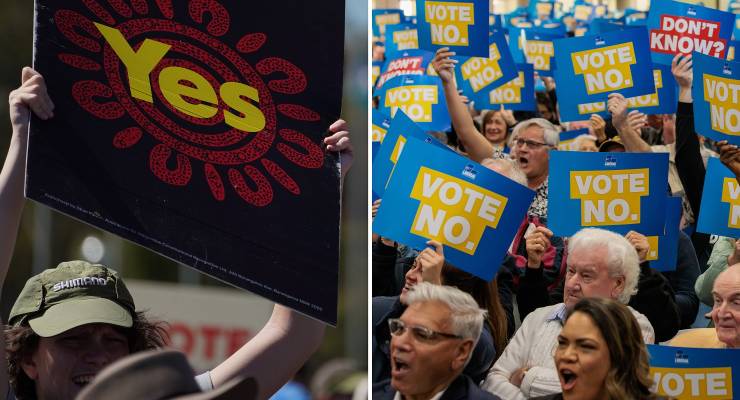
“No, it can’t do that … It won’t do that, either. It is a group of First Nations people advising government.”
“Gran, how do you want to feel about our nation when you wake up on the 15th of October? Where did you get that information from? We aren’t voting on Treaty. The constitution protects the Voice, it doesn’t provide the detail — otherwise we wouldn’t be able to easily change it if it wasn’t functioning effectively.”
“I just want you to think about it. I’ll call you again tomorrow.”
This is what my phone conversations have sounded like for the past few weeks. As a 25-year-old politically engaged person, it has been a disturbing few months watching our democracy be tested and undermined by the elected leaders of our nation. It has been painful to watch the people I love, my older family members, latch on to a Facebook share they saw last week as if it were concrete evidence of a government conspiracy. While my friends and peers are all informed, we know we exist in a vacuum, an echo chamber as a generation of voters who see social issues vastly differently from our parents and grandparents.
September polling conducted by RedBridge surveyed 1,500 voters on the Voice referendum. It indicated that although 62% of voters intended to vote No and 38% intended to vote Yes, among those aged 18-34 the Yes vote sat at a much higher 54%. From there, the Yes drop-off rate is steeper than the campaign lies being spread by the Liberal Party over the course of this campaign. The Yes vote falls as age increases, landing at a miserable 28% in the over-65s.
The demographic of a Yes voter according to Redbridge director Kos Samaras is a university-educated person under the age of 34, particularly people who immigrated and arrived after the year 2000.
When the No campaign has won in every demographic except youth and people who speak a language other than English at home, as this polling tells us, it can be hard to even fathom that young people have significant voting power at all.
But when we talk about voting power, we shouldn’t limit our impact simply to what we write on our own ballot. It is our responsibility, as the people who will inherit the future of next Saturday’s decision, to make every attempt to not only take an informed, careful approach in making our decision, but to work to combat the misinformation that will influence the votes of our loved ones.
This starts with messy, difficult conversations.
Engaging in healthy discussions about the Voice with our parents and grandparents does not mean influencing or pressuring them to vote the same way as us. Our purpose should never be to coerce, but to unpack the rhetoric of conspiracies and disengagement sold by both the Liberal National Coalition and the Murdoch media, and replace them with facts.
This referendum has served as a reminder of the way online spaces commodify fear to drive apathy and withdrawal among voters: confusion and exclusion are wielded as tools for disengagement and ignorance. This country is so terrified of getting it wrong, of not having expertise or of going beyond a Facebook infographic, that it stops many from even trying to get it right. As the online generation, this is where we need to step in.
We cannot be debilitated by our discomfort in having these conversations, because for any young voters who are not First Nations people, we need to use our positions of privilege to cut through the noise and division of the conservative, racist No campaign and re-centre what sits at the heart of the question we will be asked on October 14: do we support an alteration to our nation’s central document that recognises the First Peoples of Australia by establishing a group that gives advice to Parliament?
The question we are being asked is nothing more, and nothing less than this.
The voting power of young people only begins with our own ballots. The next week will be one fuelled by hatred, ignorance and rampant misinformation that will see Aboriginal and Torres Strait Islander peoples become a lightning rod for racism on our national stage, escalating beyond what we are already witnessing. It is our job to work to dismantle these narratives, this archaic and vitriolic messaging, and make every attempt to challenge the narratives they feed us on loop.
If you are a young person who is passionate about your vote on the Voice, it is imperative that you start by using your own.








.Hannah, thank you. You have “pushed” me into moving! I am over 80 and have shied away from joining a “phone” team. I tried it once for a previous election and as you say it is a “messy, difficult” business. I am going to connect with my team and start talking. I have already voted Yes!
Y.E.S.
It’s sad state affairs if we have to use word of mouth and direct persuasion with family, friends and community, why?
Shows how uninformed Australians are on any issue of the day, and how easy selfish nativism emerges….by design of media, LNP & ‘No’ campaign.